- Forum
- categories
- Resource recovery
- Fertiliser, soil conditioner, production of crops
- Urine reuse or infiltration
- Reply: Human urine fertiliser as a business in Malawi.
Reply: Human urine fertiliser as a business in Malawi.
20.7k views
- AjitSeshadri
-

- Marine Chief Engineer by profession (1971- present) and at present Faculty in Marine Engg. Deptt. Vels University, Chennai, India. Also proficient in giving Environmental solutions , Designation- Prof. Ajit Seshadri, Head- Environment, The Vigyan Vijay Foundation, NGO, New Delhi, INDIA , Consultant located at present at Chennai, India
This email address is being protected from spambots. You need JavaScript enabled to view it.
Pl get in touch.
Pl take my reference
SusanA member..
Head-Environment , VigyanVijay Foundation, Consultant (Water shed Mngmnt, WWT, WASH, others)Located at present at Chennai, India
Please Log in to join the conversation.
You need to login to replyMany thanks for your encouraging response. Shall write to you.
Kind regards,
H-A
M.Eng. Environmental Pollution Control
presently in Seesen, Germany
Please Log in to join the conversation.
You need to login to reply- AjitSeshadri
-

- Marine Chief Engineer by profession (1971- present) and at present Faculty in Marine Engg. Deptt. Vels University, Chennai, India. Also proficient in giving Environmental solutions , Designation- Prof. Ajit Seshadri, Head- Environment, The Vigyan Vijay Foundation, NGO, New Delhi, INDIA , Consultant located at present at Chennai, India
Dr H A Pilot.
Kudos and Congrats.
For your bold approach on urine as a usable resource.
Will deliberate on the urine usage as fertiliser Etc.
We have in our Forum a Chinese professor practices on urine as widespreD usage.
Will deliberate.
My email pl note
This email address is being protected from spambots. You need JavaScript enabled to view it.
Can discuss. Thanks
Prof Ajit Seshadri
www.vigyanvijay.org
Head-Environment , VigyanVijay Foundation, Consultant (Water shed Mngmnt, WWT, WASH, others)Located at present at Chennai, India
Please Log in to join the conversation.
You need to login to replyI was reading these older discussions, and I feel compelled to voice my views about them.
I think a difference has to be made between fecal sludge and urine. Urine carries very few if any pathogens, whereas fecal sludge is showing all the pathogens that can be in feces. Some time back, I was telling a former doctor and a present day friend of mine I am using a bit of the urine I am producing in my garden, and I was expecting a skeptical response. To my surprise he was encouraging me to do so. He was telling me that urine is considered sterile by the medical community (even though strictly speaking it can carry some rather rare diseases, which get killed within a few days of storage of the urine), and he was saying urine should be used on a large scale in agriculture. The issue is psychological rather than real.
In my case, I noticed nitrogen deficiency in my garden (the typical yellowish leaves with green veins), especially among strawberries, and that has compelled me to try the use of urine on all of my fruits. So far, the strawberries and other fruits had only been fertilized with shredded branches, leaves, some compost, etc.. Within a year, there was no sign of nitrogen deficiency, and the plants are making a very healthy impression. So, no problem about urine, but it should preferably be complemented by a source of carbon in order to 'feed' the soil. Compost is ideal, but mulch is OK, too.
Getting back to what Robert was reporting years ago regarding the application of urine during the northern winter... I don't think it makes much of a difference whether you use urine on coniferous or decidious trees. While coniferous trees may still be having a bit of photosynthesis in winter, the leaves under decidious trees will need nitrogen and other nutrients for their decomposition. I think the more important parameter is the quality, more precisely the iron exchange capacity of the soil. Soils with a good exchange capacity, i.e. in particular with a lot of humus, will be able to store the nutrients they obtain from the application of urine until the next growing season. So, it's not even necessary to have anything growing during winter applications as long as the soils are good. I would think these thoughts would also hold for the dry season in hot countries.
Hanns-André
M.Eng. Environmental Pollution Control
presently in Seesen, Germany
Please Log in to join the conversation.
You need to login to reply- rochelleholm
-
 Less
Less- Posts: 99
- Karma: 4
- Likes received: 38
In Malawi we have been looking at accessibility of sanitation facilities for several years in our other work, so the issue of reuse of faecal sludge not working well for the poorest and people with disabilities in urban Malawi complements our other ongoing research work and also efforts to document lessons learned from the field.
Rochelle
Mzuzu (Malawi)
Please Log in to join the conversation.
You need to login to reply- paresh
-

- Moderator
- Budding WASH researcher, especially interested in governance, public policy, finance, politics and social justice. Architect, Urban & Regional planner by training, Ex. C-WAS, India.I am a patient person :)
Less- Posts: 383
- Karma: 7
- Likes received: 143
Thank you for sharing your conference paper. I am not sure if the abstract captures the argument/s of the paper. The last two sentences on the other hand capture it well in my opinion.
And I was curious how the project ended up looking at accessibility of sanitation facilities and accessibility for reuse of faecal sludge. Was it by accident/happenstance or was it planned? I don't think I've come across that combination elsewhere.To ensure equitable access to sanitation in urban areas for vulnerable people, the design of household sanitation for beneficial reuse has to focus on ease of access and maintenance tasks as a priority. In terms of reuse in agriculture any designs intended to target vulnerable groups in society need to account for transport distances and intense physical requirements.
Regards
paresh
Moderator, SuSanA forum
Project Manager at ADCPS
Indian Institute of Technology - Bombay, India
Please Log in to join the conversation.
You need to login to reply- rochelleholm
-
 Less
Less- Posts: 99
- Karma: 4
- Likes received: 38
Mallory, A., Holm R. and Crapper M. “When faecal sludge reuse doesn’t work: a look at access for the poorest and people with disabilities in urban Malawi” at the 41st WEDC International Conference, Nakuru, Kenya from 9th – 13th July 2018.
wedc-knowledge.lboro.ac.uk/resources/con.../41/Mallory-2915.pdf
Abstract below added by the moderator PCP:
Reusing faecal sludge to generate value has the potential to contribute towards solving the issue of long term sanitation solutions in cities across Sub-Saharan Africa. This research was conducted to evaluate the potential for faecal sludge reuse in Malawi, and the difficulties and challenges to existing attempts at reuse in a city. We conducted 65 semi-structured interviews in a city of Malawi. The results show that two main approaches exist currently: The implementation of Skyloos as above ground household toilets which provide compost; and a central disposal site from which compost is illegally harvested. Both existing approaches to faecal sludge management and reuse were found to be inaccessible and not working when implemented for the poorest and people with disabilities.
Mzuzu (Malawi)
Please Log in to join the conversation.
You need to login to replyYes there are many published references on the urine medical residues.
Like any fertilizer or manure, the required precautions are in fact for the workers who must have adequate protection to avoid skin or respiratory contact. Workers just needs some appropriate tools to avoid splashing.
After 5 years of tests and exchanges with wordwide specialists and review of the literature my conclusion is totally favorable to the use of human urine.
I have not found any case of someone affected by a medical residue from urine-fertilized cultures. There are thousands of other toxic possibilities in agriculture. For exemple with chemical fertilizers and residues of cadmium from phosphorus. Chemicals used on farms are damaging soil and can affect the health of farmers.
Concerning urine medical residues:
- The SEI repport explains how the soil is more effective at degrading medical waste than sewage systems.
- Hammer and Clemens have published a repport in 2007 showing that human urine contains LESS medical residues than farm manure.
- In USA, the Rich Earth Institute showed me their measurements made on lettuce medical uptake. It would take you thousands of years of daily consumption to have the equivalent of a daily dose of medicine.
I continued my research comparing the mode of absorption of molecules by plants vs animals.
Plant roots are 100 to 10 000 times more selective. Plants do not absorb large carbon molecules like our digestive systems. Plants absorb water and smaller minerals ions. Therefore medical residues ( larger molecules) remain longer in the soil to continue their peaceful degradation.
In short, I continue to treat myself and to make taste the cultures of my Symbiotic garden.
The growth is super. I never had such a high sugar content in my tomatoes ( 12.2 °Bx).
My visitors enjoy it in France just like other studies in Finland, Sweden, USA, Swiss and Africa show that these crops are delicious.
See it in this video:
Enjoy !
Robert Cossette
solar-dripper.com/en/how-to-use-urine-fertilizer/
I had responded to rumors and fears conveyed in France on this subject at the beginning of the year.
See my letter and some pictures of the garden.
solar-dripper.com
Attachments:
-
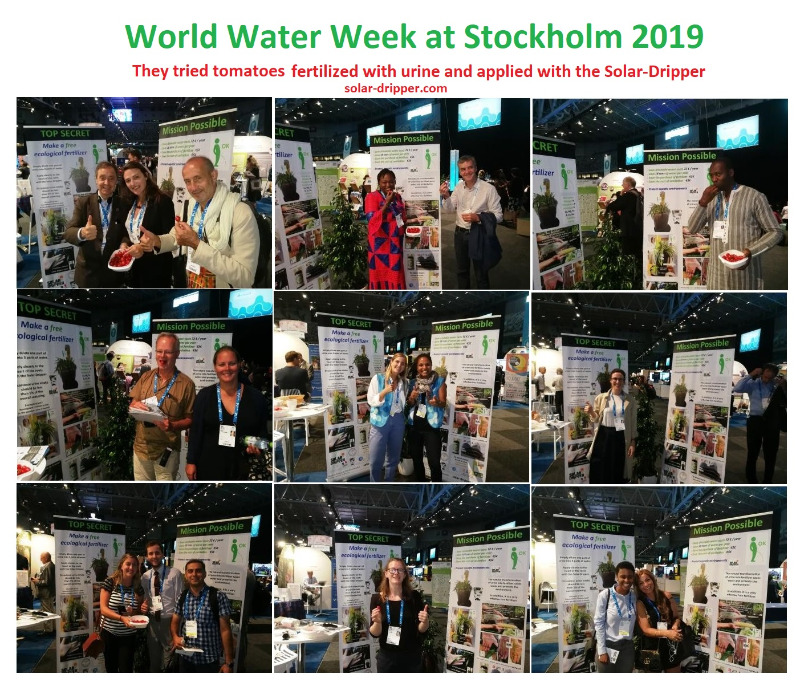 world-wate...7-19.jpg
(Filesize: 284KB)
world-wate...7-19.jpg
(Filesize: 284KB)
-
ORIAZ-2022...7-19.JPG (Filesize: 306KB)
-
1er-juille...7-19.JPG (Filesize: 242KB)
-
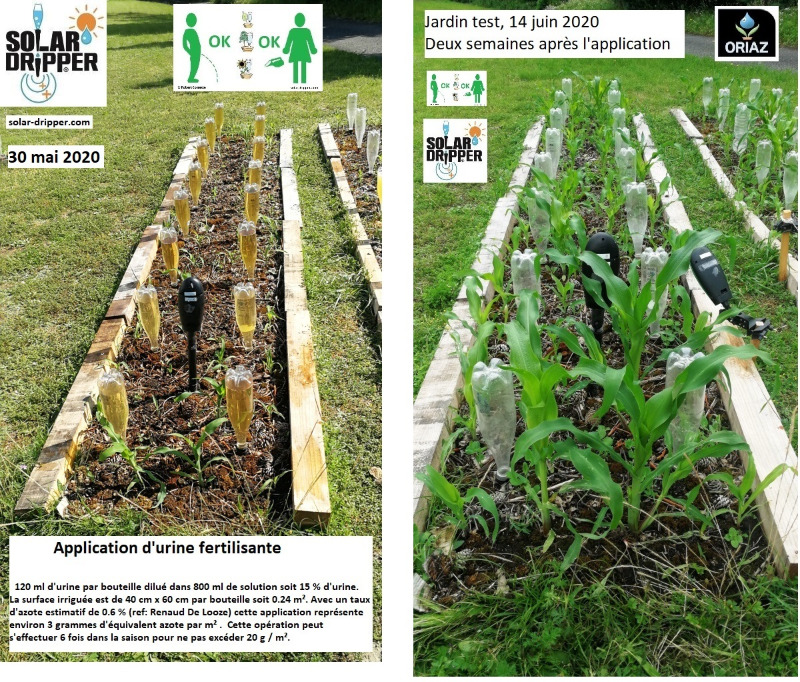 urine-avant-aprs.jpg
(Filesize: 362KB)
urine-avant-aprs.jpg
(Filesize: 362KB)
-
pisse-and-...7-19.JPG (Filesize: 259KB)
Please Log in to join the conversation.
You need to login to reply- Chaiwe
-

- Moderator
- Innovation enthusiast and Knowledge Management Expert in WASH and Climate Change while cross-cutting Youth and Gender Issues. CEO of CaDev_Capacity Development (An African Social Enterprise)
Less- Posts: 336
- Karma: 8
- Likes received: 116
I received this video that has recently gone viral in Zambia about a Malawi-based human urine fertiliser trader (a story that was covered a few years ago already). It came to my attention at a recent water forum event I was attending here in Zambia when a sector colleague wanted to get my opinion on this business venture. A day or two later, I received the actual video that was covered by a South African-based news channel about this gentleman from Malawi.
Video:
I recall that this discussion was taking place here on SuSanA and came back to check the depth of the discussion. I particularly wanted to know about my own concerns surrounding plant uptake of antibiotics and antivirals consumed by humans and dispelled in the urine. Considering the consumption of antibiotics and antiviral drugs is higher in the Southern part of Africa owing to high HIV rates and other infections..... Should we really be considering this business venture as an option?
Robert I quote your comment here:
Robert do you have access to any proven research on the topic of antibiotics and antivirals in urine fertiliser and how it affects consumers. I should probably be more accepting of this as a sanitation expert, but for now I will stick to Rabbit Urine as my first choice of urine-based fertiliser.The use of antibiotics for breeding is much higher than human doses. Often, all livestock receive the antibiotic, not just sick animals. Basically human urine contains on average less than some farm manure. The biodegradability in aerobic soil is better than in water. The answer is not perfect but I believe that this means of reducing the density and improving the degradation is OK.
Some studies have measured 100 to 1000 times less medical residues in human urine compared to farms manure. Also, a study has verified the very low absorption by plants of trace of drugs. ( Uptake studies ) Ideally the urine to fertilize food should contain low levels of medical residues or be used for trees if there are serious fears.
Kind Regards,
Chaiwe
Skat Foundation (With financial support by GIZ and SIRWASH up to November 2023)
Chaiwe Mushauko-Sanderse BSc. NRM, MPH
Independent consultant located in Lusaka, Zambia
Emails: This email address is being protected from spambots. You need JavaScript enabled to view it., This email address is being protected from spambots. You need JavaScript enabled to view it.
LinkedIn: www.linkedin.com/in/chaiwe-mushauko-sanderse-21709129/
Twitter: @ChaiweSanderse
Please Log in to join the conversation.
You need to login to replyThe production of a person ( about 500 L / year) is simply spread over an area of more than 100 m².
All the conifers are doing very well and the two epicas have produced red cones lately ( see attached picture).
The findings are > greener trees with > better growth and > no odor.
The tests continue and this very simple solution is very successful with conifer trees.
Soil tests will also be carried out.
if experts also want to make soil or any measurements of those trees you are welcome. We can ship small soil samples also.
Take care of yourself in this special time.
Robert Cossette
solar-dripper.com/comment-utiliser-urine-sous-les-arbres/
solar-dripper.com/en/how-to-use-urine-fertilizer/
solar-dripper.com
Attachments:
-
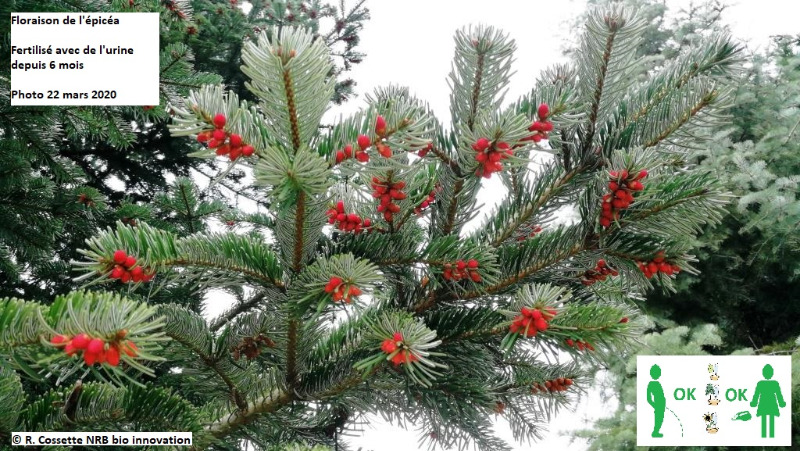 floraison-...2020.jpg
(Filesize: 215KB)
floraison-...2020.jpg
(Filesize: 215KB)
-
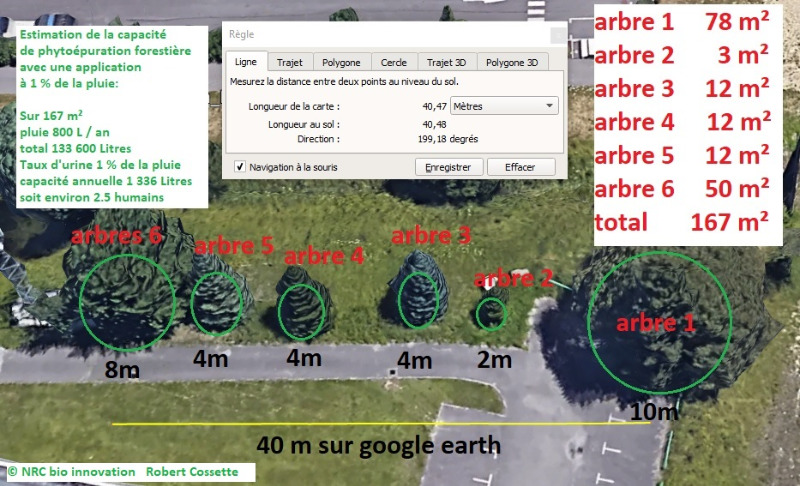 calcul-1-p...4-04.jpg
(Filesize: 168KB)
calcul-1-p...4-04.jpg
(Filesize: 168KB)
-
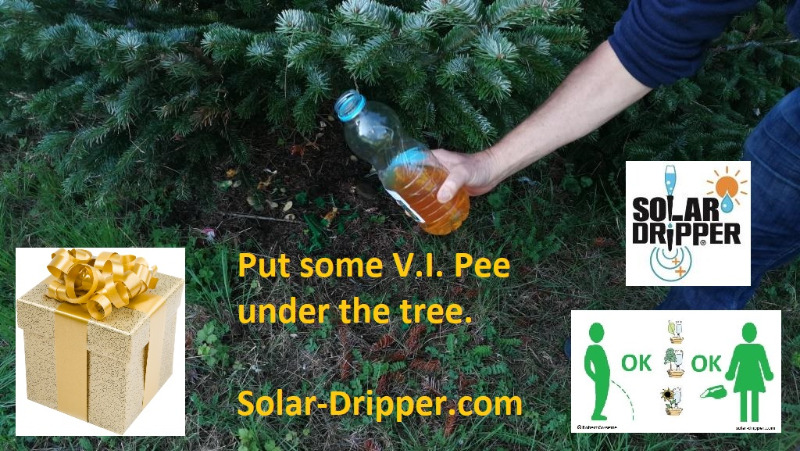 vipee-unde...4-04.jpg
(Filesize: 193KB)
vipee-unde...4-04.jpg
(Filesize: 193KB)
-
cone-rouges.JPG (Filesize: 347KB)
-
cone-rouges-2.JPG (Filesize: 297KB)
Please Log in to join the conversation.
You need to login to replyFor the application rate on the surface according to the type of crop you can refer to the book by Renaud De Looze.
His calculations are the most complete today to master the application of fertilizing urine.
For example, today I'm preparing the garlic area and I'm going to put 2 liters per m² on the ground with compost.
It is on page 39 of the german version and on page 58 of the french version.
Over fertilizing is not the objective with urine or with chemical fertilizer.
oekobuch.de/buecher/urin-fluessiges-gold-fuer-den-garten/ see german version on page 39
livre.fnac.com/a12377407/Renaud-de-Looze...s-et-composts-locaux french version.
solar-dripper.com
Please Log in to join the conversation.
You need to login to reply- Elisabeth
-
- User is blocked
- Freelance consultant since 2012
Less- Posts: 3372
- Karma: 54
- Likes received: 932
Re: Reply: Human urine fertiliser as a business in Malawi.
Yes, thanks for your answer which has satisified me. It shows me that you are not overlooking the potential problem of groundwater pollution if someone applied too much urine (just like urine leaking from pits of pit latrine can pollute groundwater with nitrate).
The trouble with groundwater is that laypersons like you and me have no easy method at hand to test the quality of the groundwater at the location where we would be applying the urine (only somewhere else where there is a well or pump or alike).
I am all for using urine as a fertiliser where it's safe to do so, and where the crop require nitrogen and phosphorus for their growth. I just wanted to point out "don't forget your groundwater".
Elisabeth
Freelance consultant on environmental and climate projects
Please Log in to join the conversation.
You need to login to reply- Forum
- categories
- Resource recovery
- Fertiliser, soil conditioner, production of crops
- Urine reuse or infiltration
- Reply: Human urine fertiliser as a business in Malawi.








